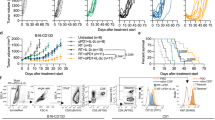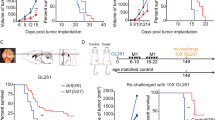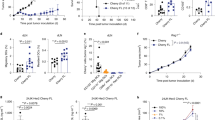Abstract
In this study, we have evaluated the local versus systemic antitumor response in tumor-bearing mice subjected to a combined therapeutic regimen based on the injection of genetically modified Friend erythroleukemia cells (FLC) producing IFN-α and expressing the HSVtk (tk) gene, and we have investigated the host immune mechanisms involved in tumor rejection and development of antitumor immunity. Repeated subcutaneous (s.c.) injections of IFNtk-expressing tumor cells, followed by GCV administration, were effective in counteracting the growth of both contralateral parental tumors as well as visceral metastases, whereas similar treatments with control tk cells (ie nonproducing IFN) were ineffective. Morphologic analyses of the homolateral and contralateral tumor tissues and in vivo immunosuppression experiments with specific monoclonal antibodies revealed that both CD4+ and CD8+ T lym- phocytes played essential roles in the generation of a definite antitumor response after the combined therapeutic regimen. We have also compared the effectiveness of irradiated versus viable tumor vaccines coexpressing the two genes in the FLC model and in the poorly immunogenic, metastasizing TS/A adenocarcinoma tumor system. Repeated injections of high doses of irradiated IFN-α-tk-expressing tumor cells followed by GCV administration resulted in the cure of the majority of mice bearing established metastatic tumors, while repeated inoculations of the same number of viable tumor vaccines were much less effective. We conclude that: (1) IFN-α is an essential co-factor in the generation of a systemic antitumor immunity following the prodrug-induced tumor cell killing; (2) vaccines co-expressing an autotoxic gene and a cytokine gene may represent promising new tools for the treatment of some cancer patients.
This is a preview of subscription content, access via your institution
Access options
Subscribe to this journal
Receive 12 print issues and online access
$259.00 per year
only $21.58 per issue
Buy this article
- Purchase on Springer Link
- Instant access to full article PDF
Prices may be subject to local taxes which are calculated during checkout
Similar content being viewed by others
Author information
Authors and Affiliations
Rights and permissions
About this article
Cite this article
Santodonato, L., D’Agostino, G., Santini, S. et al. Local and systemic antitumor response after combined therapy of mouse metastatic tumors with tumor cells expressing IFN-α and HSVtk: perspectives for the generation of cancer vaccines. Gene Ther 4, 1246–1255 (1997). https://doi.org/10.1038/sj.gt.3300518
Received:
Accepted:
Issue Date:
DOI: https://doi.org/10.1038/sj.gt.3300518
Keywords
This article is cited by
-
Antitumor immune responses mediated by adenoviral GDEPT using nitroreductase/CB1954 is enhanced by high-level coexpression of heat shock protein 70
Cancer Gene Therapy (2005)
-
Human growth hormone gene transfer into tumor cells may improve cancer chemotherapy
Cancer Gene Therapy (2002)
-
Type I consensus interferon (CIFN) gene transfer into human melanoma cells up-regulates p53 and enhances cisplatin-induced apoptosis: implications for new therapeutic strategies with IFN-alpha
Gene Therapy (2000)



